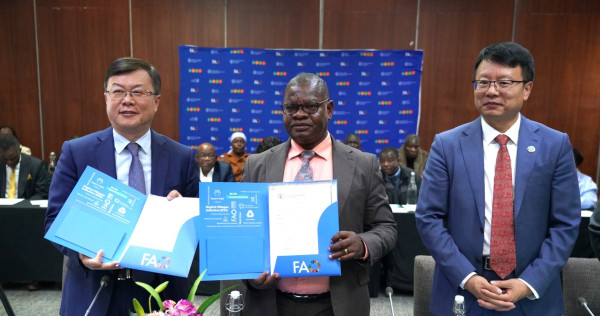Zimbabwe Leads Africa with Bold FAO-Backed Projects on Soil Health and Water Governance
Zimbabwe has taken a significant step toward improving its environmental resilience and agricultural productivity with the launch of two transformative projects by the Food and Agriculture Organization (FAO) of the United Nations. The projects focus on sustainable soil management and water governance, and are part of two global programmes led by FAO with support from South-South Cooperation partners.
The newly launched initiatives, “Capacity Development on Sustainable Soil Management in the Global South” and “National Water Roadmap towards 2030 Sustainable Development Goals”, are designed to strengthen Zimbabwe’s technical capacity in managing its soil and water resources, while aligning national development efforts with the Sustainable Development Goals (SDGs) and the country’s Vision 2030.
Speaking on behalf of the Minister of Lands, Agriculture, Fisheries, Water and Rural Development, Hon. Dr. Anxious Masuka, Ministry Permanent Secretary Professor Obert Jiri said the projects reflect Zimbabwe’s collective pledge to food security and universal access to clean water.
“Water is at the centre of Rural Development 8.0. Today, we launch not just projects, but a commitment to deliver reliable water to 35,000 rural communities and 10,000 institutions,” he said.
The soil management project will support Zimbabwe in strengthening its capacity for soil mapping, laboratory analysis, and sustainable farming practices. It aims to improve soil health, biodiversity, and conservation agriculture through regional coordination and knowledge-sharing under South-South Cooperation.
Meanwhile, the National Water Roadmap project focuses on improving water governance through inclusive, multi-stakeholder national dialogues. It aims to ensure sustainable water allocation, particularly in agriculture, and raise public awareness of water’s role in development across economic, social, and environmental dimensions.
“These twin initiatives mark a turning point for Zimbabwe,” said Patrice Talla, FAO Subregional Coordinator for Southern Africa. “By investing in sustainable soil and water management, we’re building stronger food systems and resilience to climate shocks.”
FAO has already made notable contributions in Zimbabwe’s soil and water management landscape. It has supported watershed mapping, rehabilitation of degraded catchments, and introduced water-saving irrigation that increased cereal yields by up to 25% in pilot districts. In soil management, FAO delivered soil fertility maps for 200,000 hectares, guided farmers on fertilizer use, and promoted conservation agriculture that reduced topsoil loss by 40%.
Regionally, FAO worked with the Southern African Development Community (SADC) to harmonize soil testing standards and implemented climate-smart land management practices through the GEF-funded SOIL Care Project across six countries.
“These projects are part of a global movement to build sustainable soil and water systems, and Zimbabwe is the first country to implement them,” said LiFeng Li, Director of FAO’s Land and Water Division. “Through technical cooperation, institutional collaboration, and knowledge exchange, we are safeguarding natural resources for the present and future generations.”
Following the launch, the soil management project will convene an inception workshop to set implementation modalities, choose field trial sites, and finalize workplans and budgets. The water governance project will establish a national taskforce guided by global technical frameworks and advisory support.



